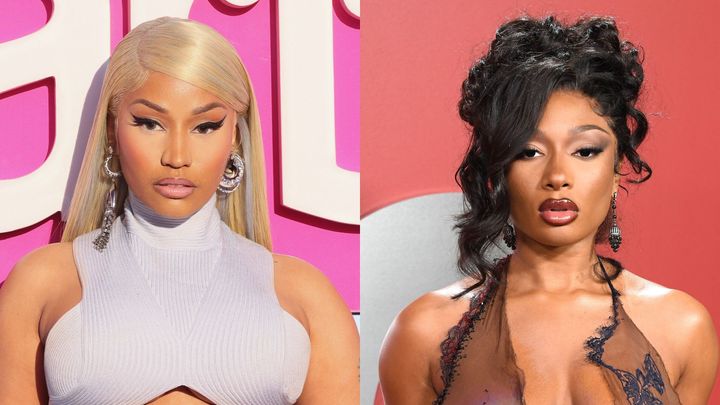
Photo courtesy: Huff Post
In recent years, the rap industry has seen a surge in conflicts between female artists, sparking debates about whether these beefs overshadow the music itself. One of the most notable feuds in recent memory involves Nicki Minaj and Megan Thee Stallion, two powerhouse figures in the rap scene whose tensions have escalated to public diss tracks and social media spats.
The drama between Nicki Minaj and Megan Thee Stallion reached a boiling point with the release of Minaj’s single “Big Foot,” widely interpreted as a response to Megan’s track “Hiss.” The beef stemmed from a line in Megan’s song referencing “Megan’s Law,” a federal statute concerning registered sex offenders. Some listeners interpreted this reference as a dig at Minaj’s husband, Kenneth Petty, who has a criminal history. Minaj defended her husband and retaliated with lyrics suggesting Megan’s lies and exploiting personal tragedies.
This feud is just one example of the growing trend of women’s rap beef taking center stage in the industry. Another prominent clash that garnered significant media attention was the feud between Nicki Minaj and Cardi B, which began with Cardi’s breakout hit “Bodak Yellow” and escalated into physical altercations and social media spats.
The impact of these beefs extends beyond the artists involved, influencing how women in the industry are perceived and shaping the narrative around female empowerment and solidarity. However, it is essential to consider the broader implications of these conflicts and their effects on the music industry and its audience.
Gabriel Jean-Simon, a music industry insider and personality, believes that rap beefs are inherent to the culture and not necessarily perpetuated by the music industry itself. He notes that women may engage in beef more frequently due to the pressure to prove themselves in a male-dominated field.
“Rapping is an individual industry. So, the individuals themselves are always in control of what they want to do. So if they start beef, there will be beef”, Simon stated. However, he does not see a need for the industry to intervene to shift the narrative, as it is ultimately up to individual artists to decide their actions.
On the other hand, the media’s coverage of women’s rap beef has positive and negative consequences. While it brings attention to the industry and generates buzz, it also sensationalizes conflicts and exacerbates drama.
Ernest Nelfrad, a cultural critic and music industry analyst, might argue that media coverage of women’s rap beef can positively and negatively impact public perception of the artists involved and the industry.
“By openly addressing these challenges, the music industry can move towards a more inclusive and supportive environment for female artists, paralleling the support seen for their male counterparts, “ Nelfrad said. “This focus on resolving women’s rap conflicts can inspire stakeholders to collaborate, overcome obstacles, and foster a community that embraces diversity and talent within the hip-hop genre.”
However, excessive focus on beef can overshadow the music itself and perpetuate negative stereotypes about female artists. Another perspective comes from Rodney Eugene, a manager and entertainer in the music industry, which highlights the impact of these beefs on the perception of the music industry.
“Media coverage of women’s rap beef can be a double-edged sword. While it brings attention to the talent and strength of female artists, it often sensationalizes conflict, turning their artistry into a sideshow,” Eugene said. “Instead of celebrating their creativity, we are caught up in a narrative that divides fans and diminishes the true essence of their music.”
He believes that while media coverage can raise awareness, it distorts reality and fuels fan division. This, in turn, can detract from the artistry and creativity of female artists, reducing them to mere characters in a never-ending soap opera.
Women’s rap beefs undoubtedly attract attention and shape the industry’s narrative, but their impact goes beyond entertainment. They influence how women are perceived in the industry, affect their relationships with fans, and raise questions about authenticity and empowerment. As the rap scene evolves, it is crucial to navigate these conflicts with nuance and recognize their broader implications for the music industry.